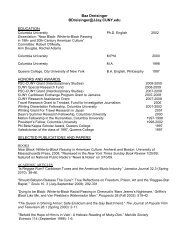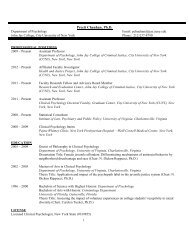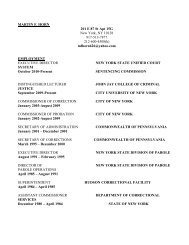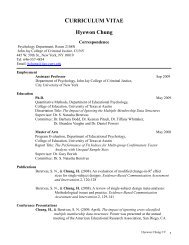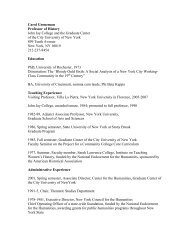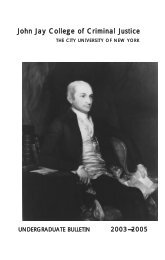Bulletin - John Jay College Of Criminal Justice - CUNY
Bulletin - John Jay College Of Criminal Justice - CUNY
Bulletin - John Jay College Of Criminal Justice - CUNY
You also want an ePaper? Increase the reach of your titles
YUMPU automatically turns print PDFs into web optimized ePapers that Google loves.
Courses <strong>Of</strong>fered<br />
PHI 203 Political Philosophy<br />
3 hours, 3 credits<br />
Examination of the philosophical presuppositions about human<br />
nature that are inherent in political theories from Plato to Marx and<br />
concepts of sovereignty, freedom, authority and law.<br />
Prerequisites: ENG 101, and sophomore standing or above or<br />
permission of the section instructor<br />
PHI 204 Logic<br />
3 hours, 3 credits<br />
An exposition of formal and informal methods of evaluating<br />
reasoning in arguments and texts. We will examine systems or<br />
models of deductive reasoning, problems of translation from natural<br />
to formal languages, reasoning and rhetoric in complex arguments<br />
and the foundations of the logic of investigation.<br />
Prerequisite: ENG 101<br />
PHI 205 Philosophy of Religion<br />
3 hours, 3 credits<br />
Examination of religion from a philosophical viewpoint: including<br />
questions such as the existence of God, the nature and reality of<br />
miracles, the possibility of an afterlife, and the foundations of<br />
morality in religion. Readings from classic philosophers such as<br />
Plato, Aristotle, Aquinas, Hume, and Kant, as well as contemporary<br />
philosophers.<br />
Prerequisites: ENG 101; sophomore standing or above or permission<br />
of the section instructor<br />
PHI 210 Ethical Theory<br />
3 hours, 3 credits<br />
Ethical theory is the attempt to understand the principles that should<br />
guide our thinking and decision-making about morally important<br />
issues. In this course, we investigate moral theory in the history of<br />
philosophy. This course compares first principles and moral<br />
intuitions, moral relativism and moral dogmatism, moral character<br />
traits and the ethics of duty. Focus will be on theories, arguments and<br />
their relation to practical issues. We will examine these issues with<br />
reference to historically influential ethical systems, with an eye<br />
toward better understanding those systems and their relevance. The<br />
course will examine the ancient Greek tradition, which is still pivotal<br />
to the ethical debates of today. Part of the analysis of the dominant<br />
theories will include important alternatives to this tradition. These<br />
alternatives might include, but are not limited to, feminist ethics,<br />
Buddhist ethics, animal ethics, and environmental ethics. We will<br />
also be calling into question some of the key assumptions these<br />
ethical systems make, such as who counts as a morally relevant being<br />
and what sort of considerations are morally relevant.<br />
Prerequisites: ENG 101, PHI 105<br />
PHI 224 Death, Dying and Society: A Life Crises<br />
Management Issue<br />
(Same course as ANT 224, PSY 224 and SOC 224)<br />
3 hours, 3 credits<br />
Death and dying will be viewed from the perspectives of a variety of<br />
academic disciplines and applied fields. The course will deal with<br />
the dying process: the different cultural practices and beliefs related<br />
to this process; its impact on the individual and his or her family,<br />
particularly in the areas of grief, mourning and restructuring of the<br />
family; and it will examine the ways different occupational groups<br />
are routinely involved with death and dying and the methods they<br />
evolve to manage it for others and cope with it themselves. The<br />
course will also explore different types of death, death at different<br />
periods in the life cycle, euthanasia, abortion and ethical, religious<br />
existential issues related to death and dying. The course will be<br />
multidisciplinary.<br />
Prerequisites: ENG 101 and an introductory course in sociology,<br />
anthropology, philosophy, or psychology<br />
126



